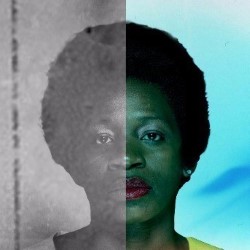Woke (a word used in the Black Lives Matter movement to refer to awareness of racial justice issues) was directed by Caitlin Skinner, and written by Apphia Campbell (Black Is the Color of My Voice) and Meredith Yarbrough. It tells the story of black student Ambrosia starting university in St Louis weeks after Michael Brown was killed by a police officer in Ferguson (a suburb of St Louis) in 2014. Alternating with her story is that of Assata Shakur, whose autobiography is assigned reading for Ambrosia, the notorious Black Panther, who fled to Cuba after being falsely convicted of killing a white police officer in 1977.
From the opening rendition of St. Louis Blues – and subsequent elucidation of the song’s history, Apphia Campbell has the audience entirely mesmerised. She plays all the characters, transitioning gracefully between the naïve and cautious Ambrosia and the more confidant and passionate Assata, as well as representing some of the minor characters.
Blues and gospel style songs, many of them on the theme of freedom, add texture to the piece, along with elements of spoken word and dance – including some particularly impressive African dance – all of which are handled superbly by Campbell. The staging is simple and efficient, with few props – mostly consisting in a small table, barstool, and box – which Campbell moves around the stage, constructing different structures, and throwing them around in moments of frustration. Lighting changes help to differentiate between Ambrosia and Assata’s scenes.
Woke asks whether Black Lives Matter and the Black Liberation Movement constitute separate campaigns or are expressions of the same battle in different times, using parallels between the lives of Ambrosia and Assata in a thought-provoking and insightful manner to subtly suggest an answer. It skillfully educates audiences about the causes and contexts of both movements without making anyone feel demonised. Ambrosia starts from a position of inherent trust in the legal system and a preference for saying “all lives matter” over “black lives matter” and gradually changes her mind as circumstances drive her to a more informed point of view. Rather than criticise the former view, the play simply provides evidence for its naivety and informs about some of the relevant issues. The detail about how the American justice system turns black citizens into criminals through issuing unaffordable fines for trivial or imaginary crimes is particularly enlightening. With overt racism clearly on the rise under Trump’s regime, Woke is undeniably timely, and somehow, despite the events of the past eight months, manages to end leaving audiences feeling almost optimistic.
